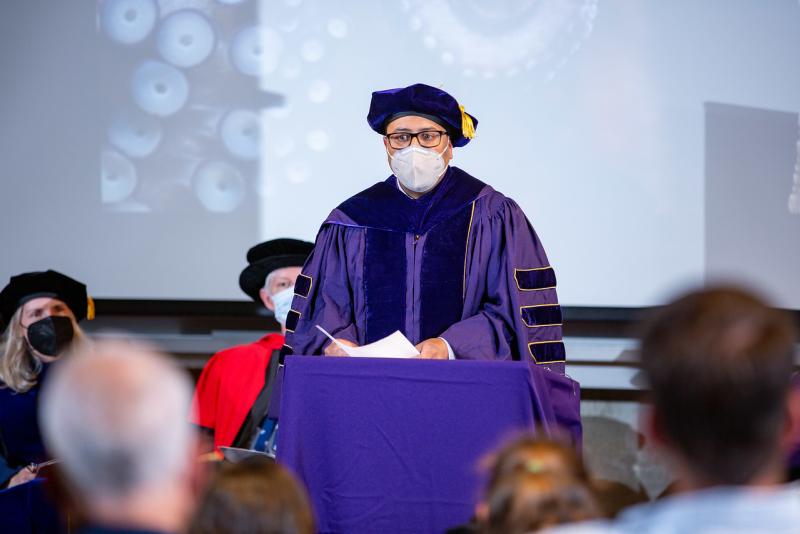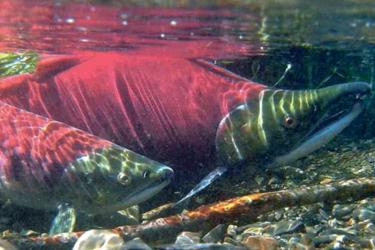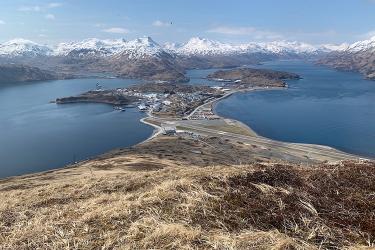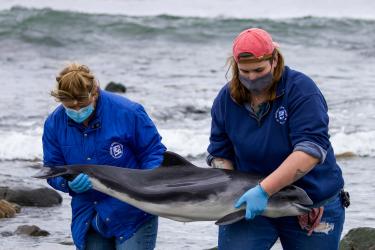June is a busy time of year. The school year is winding down, graduation celebrations are ramping up, and students are heading off to summer jobs, internships, and new opportunities. Taking these next steps can be daunting. Deputy Director of Alaska Fisheries Science Center’s Auke Bay Laboratories, Jamal Moss, has some sage words for students interested in science, technology, engineering, and math careers as they look to the future.
From the MCATS to investment banking, Moss’ path to Alaska Fisheries Science Center was anything but straightforward. Given his experiences, Moss has a lot to share about his journey and the importance of staying true to yourself. He was honored to participate in two opportunities this spring that allowed him to talk about his journey and engage the next generation of scientists and engineers.
First, Moss was welcomed by the Francis Parker School of Chicago as its 15th annual Robert A. Pritzker Visiting Scientist • Inventor • Engineer in Residence on May 2, 2022. The program aims to expand science education opportunities at the school and foster an ongoing dialogue among students and teachers about current issues in science.
Not long after his whirlwind trip to the Midwest, Moss traveled to Seattle, Washington. He gave the commencement speech for the University of Washington's School of Aquatic and Fishery Sciences graduating class. The School of Aquatic and Fishery Sciences is dedicated to sustaining healthy marine and freshwater environments. Moss’ speech focused on connection, diversity, and facing challenges.
Moss sat down with us to discuss his recent trips.
What was your reaction when you learned that you were being honored by the Parker School?
As a Chicago native, it was very meaningful. I attended the University of Chicago Laboratory School for elementary and middle school and Francis Parker School was a main rival of ours. The Chicago Laboratory School is located on the South Side and Parker is on the North Side of Chicago. Back in my day, we were kind of like Cubs fans versus Sox fans. So it feels really good to have an opportunity to return to my old stomping grounds. It’s great to be able to give back as a former city kid and provide an insider’s view into Alaska fisheries, its peoples, and the five large marine ecosystems that we study.
The Parker School’s mission is to “educate students to think and act with empathy, courage and clarity as responsible citizens and leaders in a diverse democratic society and global community.” Empathy, courage, and service are a huge part of who I am. This is how I strive to show up in my daily work life. So I felt connected to this community even from 3,100 miles away.
What did you share with the kids?
During the fall semester, I gave three virtual lectures about Alaskans’ relationship with the marine environment, an overview of Alaska fisheries, and the importance of food security. I introduced students to Alaska’s large marine ecosystems and ecosystem-based fisheries management. Better understanding climate change and adapting to a changing climate was the Parker School’s overarching science theme during the 2021–22 school year. I tried to craft what I shared around those themes. I also jumped right in with sharing how our work at NOAA Fisheries touches people and our stewardship mission.
During my visit in May, I met with the Parker Science Department and all of the 6th, 7th, and 9th grade classes. Our discussions ranged from the ecology of juvenile salmon and marine fish to the changing climate’s effects on fisheries and ecosystem processes. We also talked about growing up in the Chicago area, adapting to life in Alaska, and how climate change is impacting their lives.
I also met with members of the Upper School Underwater Robotics team. We discussed types of robotic equipment NOAA scientists use to accomplish our mission. I also shared some high points from my almost two decades of leading trawl-based fisheries oceanographic surveys in the Gulf of Alaska and Bering Sea.
The trip culminated with my evening presentation. It was entitled “Realizing Your Dreams: How a Kid from Chicago Found His Path Studying Fish and Marine Ecosystems in Alaska.” I structured the talk around six principles, or lessons learned, that have contributed to my success. They included:
- Staying true to yourself
- Being curious and keep learning
- Finding someone to help you
- Taking risks and not being afraid of failure
- Being authentic
- Never giving up
I conveyed each principle through a specific story about my work, a particular adventure in the field, or other research experience I’ve had over my career with NOAA.
What was it like to give the commencement address to the University of Washington’s School of Aquatic and Fishery Sciences in Seattle?
It was an incredible honor. As a SAFS graduate myself, it was great to go back and celebrate with the 2022 graduates and be the first to welcome them into our tight-knit network of alumni. The graduates were absolutely amazing. I was really impressed by their research. For instance, they were working on studies looking at the bioaccumulation of heavy metals and effects of microplastics, population assessments, reproductive biology, phenotypic plasticity, and ecosystem variability and how it influences marine species.
My overarching goal for the keynote address was to inspire the graduates to reach for their dreams and embrace their humanity as they transition from students to professionals. One of my goals this year was to inspire others. With help from Vice Admiral Michael Devaney, my NOAA coach, I was able to reach that goal. I’ve been deeply moved and inspired by some pretty special people this past year who have had a hugely positive impact on my life. This was an opportunity for me to give back.
Can you tell us more about your work as a mentor and what leadership means to you?
I find joy in mentoring others. How I show up as a father, friend, and colleague is influenced by leadership principles, such as modeling the behavior I want to see in others, being authentic, and enabling others to act. I served as a team lead for many years before becoming the Auke Bay Laboratory’s deputy director. I thought I was doing an OK job at it, but also felt as though I could do even better with some guidance and leadership training. I was fortunate enough to be accepted into the NOAA West Leadership Program. I learned leadership skills and was given hands-on opportunities to put that knowledge into practice.
The NOAA West Leadership Program has been a transformative experience for me. It was wonderful to have so many talented NOAA faculty teaching and sharing their leadership stories and experiences with us. Our cohort of students also learned from each other, formed deep bonds, and became life-long friends.
The pilot run of the program focused on NOAA culture, regional cross-line office networking and learning opportunities, and support for new and emerging leaders. More than 20 senior leaders from all line offices in the region volunteered to teach leadership courses. I was the only student with an Alaska duty station in the program. I am very grateful for that opportunity and look forward to sharing what I learned with others in our region.
What advice do you have for today’s youth interested in pursuing STEM fields?
The first thing I’d say is to always be true to yourself and engage in the work that speaks to your heart. Being true to ourselves allows us to approach life wholeheartedly. So please follow your heart and pursue your passions wherever they take you.
It is important to take risks and not be afraid to fail. Our failures are a testament to our willingness to take risks, face down adversity, and challenge the status quo. The key to failure is to learn from it, and to never give up.
As we endeavor to do great things, take risks, and occasionally fail, it is incredibly important to be kind to ourselves. Sometimes we need to remind ourselves to let go of negative thoughts and replace them with love, compassion, and generosity.
It is also important to find someone to help you throughout your career. That help might come in the form of coaches, mentors, colleagues, or even your peers.
It is also important to be authentic. Authenticity is key in forging connections. We can be our authentic selves by being in touch with our feelings and not hesitating to act upon them. We can also share those defining moments and events in our lives with others.
Being authentic involves a degree of vulnerability. If you want to have deep and meaningful relationships with those around you, you will also need to allow yourself to be vulnerable.
And finally, be intentional about leadership. Being able to communicate your story and share who you are will play a big role in how you connect with others. You will need to communicate your values, share how you want to make a difference, and let people know what you want to accomplish as a leader.




